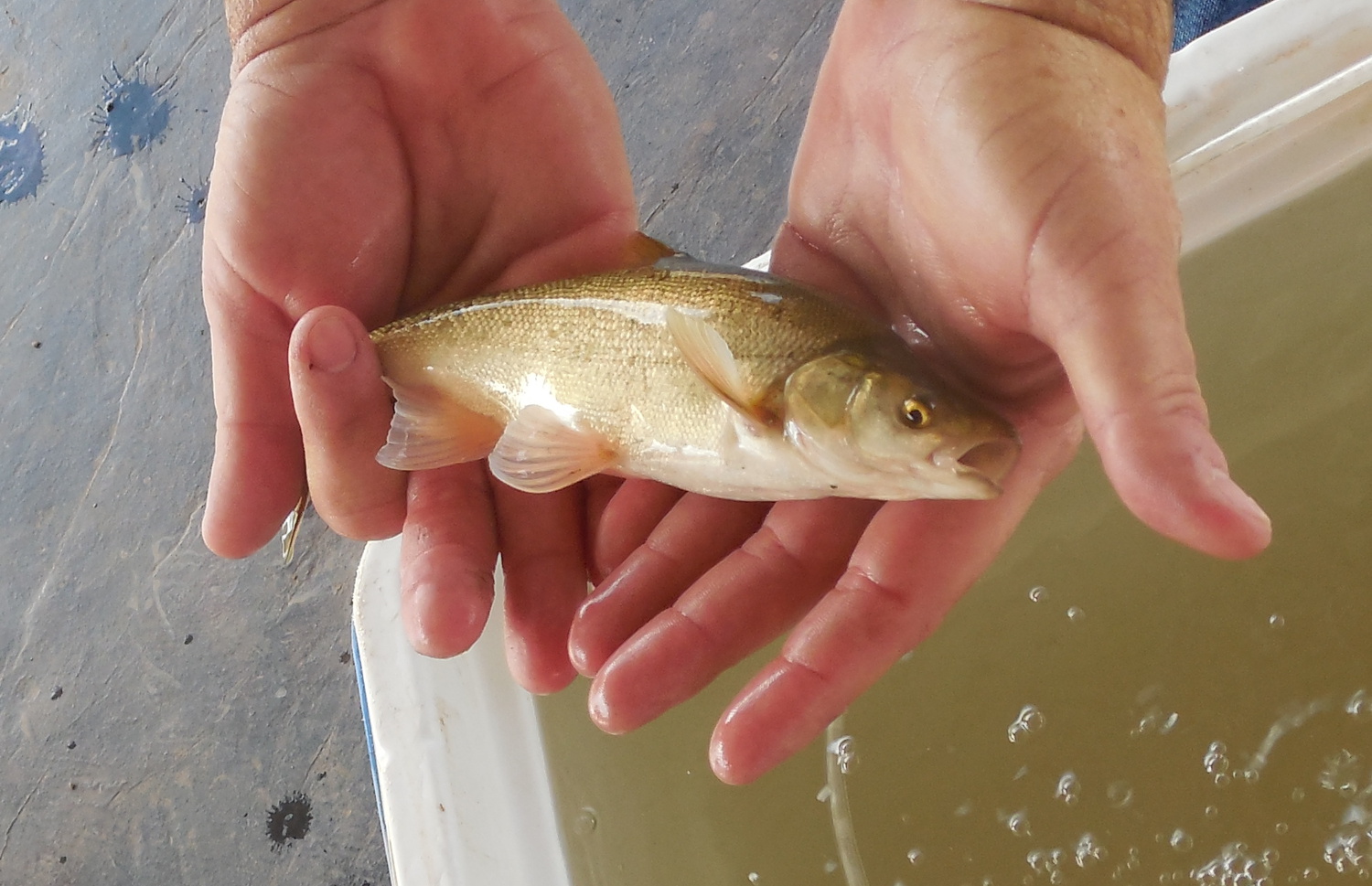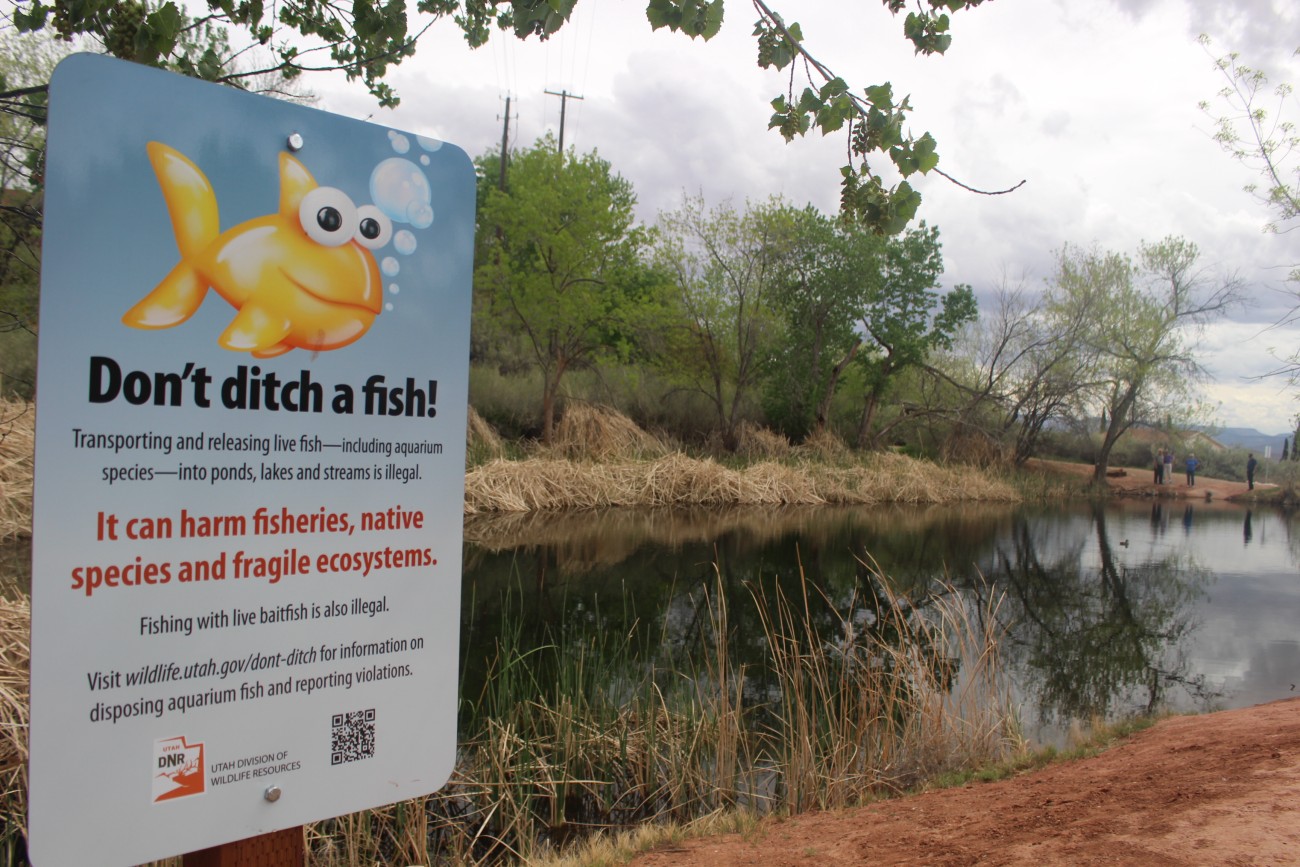ST. GEORGE — Whether it’s using a live non-native bait fish at a favorite fishing hole or just dumping an unwanted goldfish into the stream at the Red Hills Desert Garden, wildlife officials have a message for you: Don’t do it.

Over the years non-native fish species have wreaked havoc on local reservoirs, fisheries and the Virgin River.
According to the DWR, the problems the transplanted fish can create include outcompeting native fish for food sources, carrying parasites and pathogens that can harm native fish, preying on native fish and surviving and reproducing to the point of becoming an invasive species.
Efforts to remove the invasive fish can cost tens of thousands of dollars and disrupt recreational use for long periods of time.
“Just one released goldfish can have a big impact,” said Melinda Bennion, a native aquatics biologist with the Utah Division of Wildlife Resources.
The Utah DWR has worked to spread awareness about the risk of invasive species statewide for many years. Locally these efforts are aided through a partnership with the Washington County Water Conservancy District’s Virgin River Program.
The Virgin River plays host to various native fish that are listed as either endangered species or state-protected conservation species. Among those species are the woundfin, Virgin River chub and Virgin spinedace.
In 2014, Arizona and Utah wildlife officials had to treat a 17-mile segment of the Virgin River due to the introduction of red shiners, a non-native bait fish that threatened the native woundfin species.
Using live bait fish in Utah is also illegal.
The red shiners are an example of a fish that would outcompete and out-reproduce the much rarer and endangered woundfin, said Steve Meismer, local coordinator of the Virgin River Program. One red shiner female can produce up to 10,000 offspring, he said.
The chemical used to treat the river and kill off the red shiner is called rotenone. It is a natural product derived from the roots of South American plants and is specifically toxic to gilled organisms because it interrupts oxygen uptake from the water at the cellular level. It also completely decomposes without leaving any harmful residue.

Rotenone was most recently used on the Kolob Reservoir. In late 2018, three non-native species of fish – yellow perch, green sunfish and bluegills – were illegal stocked at the reservoir. This resulted in the reservoir having to be drained in addition to the chemical treatment. The reservoir was eventually refilled and restocked with fish by mid-2019.
Similar incidents took place at Grandpa’s Pond in Hurricane and Gunlock Reservoir in 2015 that required both bodies of water to be treated and drained.
“That causes a reset of the whole fishery,” said Christian Edwards, also a DWR native aquatics biologist. “It can take years for that to come back.”
An area that has been a popular fish-dump site is the Warms Springs pond in Washington City. Also known as the Boilers, the pond maintains a constant temperature of 70-75 degrees. Over the decades people have dumped not only their pet goldfish here but also more exotic fish like pacus and pet turtles.
“That place has become an interesting menagerie over the years,” Meismer said.
Unlike other bodies of water, the introduced species at the Boilers have not been as big a concern, as they are largely contained to that area and do not pose a threat to the species of the Virgin River, Meismer said.

Another area hit with unwanted goldfish has been the stream at the Red Hills Desert Garden in St. George. The garden features a stream of Virgin River water that meanders through the garden and also serves as a home for some of the river’s endangered and threaten fish species for educational purposes, and pet fish such as goldfish pose a serious problem.
“Their reproductive capability is so great it can outcompete native fish,” Meismer said. “They also eat the larva and eggs of native fish. It’s the same thing that occurs everywhere else, and we’ve been dealing with the issue overall of the last 25 years.”
Getting rid of the invasive fish can be a pricey endeavor, Meismer said.
Purging and treating the Red Hills Desert Garden of the unwanted fish in 2016 was estimated to run $10,000-$15,000. Treating a 30-mile stretch of the Virgin River can run up to $50,000, while dealing with reservoirs like Gunlock and Kolob can run as high as $100,000.

Those estimates do not include potential loss of revenue associated with the cessation of recreational use of the impacted areas during treatment.
In order to help spread awareness of the threat and impact of invasive fish species, the DWR has created the “Don’t ditch a fish” campaign. These efforts include signs warning of illegal fish dumping posted at various water bodies throughout the state.
Those seeking help to properly dispose of aquarium species can contact the DWR for help.
In addition to fish, the DWR and Virgin River Program have also had to deal with invasive vegetation and animal species such as bullfrogs and tree frogs.
“That’s one of our biggest issues,” Edwards said. “People don’t realize the threat they pose.”
There is also the persistent threat and continued boat inspection points for the invasive quagga mussel that can threaten water infrastructure and water-based ecosystems. The mussels are present and spreading in parts of Lake Powell with state and local water officials zealously working to keep the infestation contained.
Copyright St. George News, SaintGeorgeUtah.com LLC, 2020, all rights reserved.